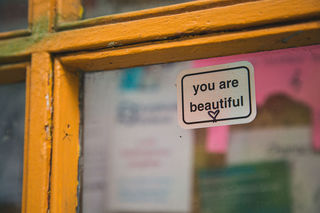Attention
Stop Saying “You Are Beautiful”
Those "You are beautiful" messages can backfire.
Posted October 30, 2017 Reviewed by Ekua Hagan
I believe the message is well intended. I understand that it’s a reaction to a culture that makes people (especially women) feel so ugly, so often. But as a psychologist and body image researcher, I also believe the ubiquitous “you are beautiful” message is misguided at best and harmful at worst.
First, there is no evidence that women struggling to appreciate their looks actually believe that message. Words are powerful, but they’re not magic. Do we really think that the onslaught of airbrushed-to-perfection media images and the sting of body-shaming trolls can somehow be battled with a simple, “You are beautiful”? Given a lifetime of reminders that women’s bodies are almost never acceptable the way they are, what kind of impact could those words realistically have?
Every day, women move around in a culture that does its level best to make them dissatisfied with what they see in the mirror. A well-intentioned message on a Post-it stuck to a mirror is unlikely to make a woman feel better about her appearance. In fact, there are good reasons to think it will make her feel worse.
To start, women will often discount or disbelieve the “You are beautiful” message. Social psychologists have amassed decades of research demonstrating that when a message is inconsistent with what you believe, you tend to generate counterarguments in response to it. Instead of making a woman feel better about how she looks, reading that “You are beautiful” may instead send her down the road to mentally reviewing everything she finds non-beautiful about herself. “You are beautiful” prompts “No, I’m not. And here’s my evidence.”
Research by psychologists at the University of Waterloo and University of New Brunswick demonstrated how this process might unfold. Though focused on general self-esteem (instead of appearance self-esteem), the results are clearly applicable to “You are beautiful.” The researchers found that asking individuals with low self-esteem to repeat the phrase “I’m a lovable person” made them feel worse about themselves, instead of better. The “lovable” affirmation only worked for people who already felt pretty good about themselves. Perhaps “You are beautiful” acts as a brief confidence boost for a woman who already feels attractive, but what is it doing to the many women who struggle with profound body image issues?
There’s another, more important reason to question the efficacy of the “You are beautiful” message. Those three words immediately draw your attention to how you look. You might have been having a perfectly lovely day, thinking about things that have nothing to do with your appearance. But you can’t encounter “You are beautiful” without taking a moment to wonder, “Wait, am I?”

That drawing of attention to one’s appearance is bad news. Research has demonstrated that one of the reasons even brief exposure to all those Photoshopped media images of women makes women feel so awful is because these types of images activate appearance schemas. In other words, they heighten our awareness of and attention to information that’s focused on appearance — our own and others’. A study of elementary-school girls in Australia found a similar effect for appearance-focused conversations with peers. Girls who frequently talked about appearance with their friends seemed to feel worse about their bodies, because those conversations increased the time they spent thinking about how they looked. Women don’t need anything else from this culture reminding us that we should be thinking about how we look. We get enough reminders already.
There’s something disingenuous about expecting a woman to live in a culture that systematically reminds her of every failure to meet an absurd beauty ideal and then asking her to nonetheless feel beautiful. Instead of telling women they are beautiful, let’s tell them they don’t have to be. Let’s remind the women in our lives that we value them for what they do, not how they look.
I’m in favor of positive, affirming messages. But why not focus those messages on qualities over which we have much more control? Let’s direct our attention to attributes that matter more than how we look.
Facebook image: Cultura Motion/Shutterstock


